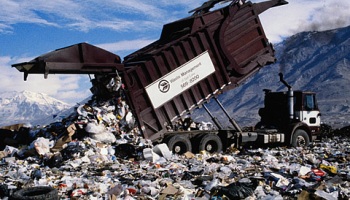

The Council of the European Union (EU) on Monday determined its first-reading position on new electrical waste rules – another step towards bringing in tighter requirements on the recycling and reuse of junked electrical and electronic equipment.
The Council’s position proposes lower targets for e-waste recovery than that approved by the European Parliament last month, a fact criticised by charity Computer Aid International.
The Council follows not far behind the European Parliament, which voted its first-reading position on 3 February. Negotiations for an agreement within the European Parliament are expected to take place later this year.
The update to the Waste Electrical and Electronic Equipment (WEEE) directive was originally proposed by the European Commission in December 2008. It has been repeatedly delayed, most recently last October.
The directive covers waste items such as mobile phones and household appliances, and is intended to improve collection and recycling of used products, as well as reducing illegal exports of electronic waste from the EU to countries in regions such as Africa.
Currently, EU countries must annually collect at least 4kg of electrical waste per inhabitant, but the update would adapt this to the size and economic situation of individual EU countries.
The Council’s agreement would oblige member states to annually collect 45 percent of the average weight of electrical and electronic equipment placed in their national markets, with the targets being flexible for some states where consumers use fewer electronic devices.
This initial target would come into effect four years after the entry into force of the revised law. Four years after that, the target would be raised to a 65 percent collection rate.
This target is lower than that approved by the European Parliament, which raised the bar as high as 85 percent. Computer Aid said the lower targets showed a lack of seriousness.
“With the EU expected to generate some 12 million tonnes of waste electrical and electronic equipment per year by 2020, we are frustrated that the European Council is taking such a softly-softly approach in addressing the looming e-waste crisis,” said Haley Bowcock, environmental advocacy officer at Computer Aid, in a statement.
“With only one third of e-waste collected in the EU being treated according to the requirements of legislation, it is clear the bold changes to the WEEE Directive are necessary to mitigate the environmental and health risks posed by e-waste. We hope that negotiations between the Council and the European Parliament later this year yield a Directive that is as bold in ambition as the exploding e-waste problem is serious.”
The Council widened the scope of the directive to cover in principle all electric and electronic equipment, beginning six years after the law entered into force. This would include photovoltaic panels which would have to be collected separately.
The Commission will have the opportunity to propose changes to the scope of the law after carrying out an analysis of the impact on businesses and the environment, the Council said.
The Council’s agreement also is intended to encourage the reuse of entire appliances by including reused appliances within the overall goals for recovery and recycling. These goals would be increased by 5 percent. The higher target would take effect three years after the new rules entered into force, the Council said.
Computer Aid has said that reuse is ultimately the best way of dealing with the e-waste problem.
“Reuse is the most environmentally friendly option for much electronic equipment,” said Bowcock, following the European Parliament’s vote last month. “For example, it takes 240kg of fossil fuels, 22kg chemicals and 1,500 litres of water to produce one PC. Furthermore, each computer has a potential lifespan of ten years but UK consumers usually replace equipment after only 3-4 years. Consequently the lifespan of most unwanted IT could be doubled instead of being discarded.”
“In order to better manage the rising volumes of e-waste, targets for re-use and the mechanisms to support these targets should be much more ambitious,” said Bowcock. “For instance, in our experience, there is potential for Europe to reuse 75 percent of ICT equipment and we hope that this tentative step in the right direction paves the way for more ambitious proposals and actual reuse in the near future.”
Computer Aid has long championed the revisions to the WEEE Directives and has published its own set of recommendations. The charity actively recycles old computer equipment, and last year launched a solar powered Internet café in Kenya to enable rural communities with no electricity to get online.
Despite supporting greater recycling, the current government has in fact scrapped the WEEE Advisory Body which oversaw the introduction of the WEEE directive in the UK, and reports have found that the UK is failing to stem the toxic tide of e-waste flowing to the developing world.
Former Cruise chief executive Kyle Vogt reportedly raises $150m for The Bot Company at $2bn…
Gotbit founder Aleksei Andriunin pleads guilty to manipulating tokens' trading volume and price after extradition…
ByteDance's largest US investors reportedly in talks for majority stake in US TikTok spin-off, with…
Apple reportedly reassigns Siri development to executive behind Vision Pro after acknowledging delays to much-hyped…
TikTok parent ByteDance, a major AI player in China, releases open technique for training LLMs…
Norwegian man files data-protection complaint after ChatGPT falsely states he murdered two of his sons,…
View Comments
"...as well as reducing illegal exports of electronic waste from the EU to countries such as Africa."
Africa isn't a country.
Thanks. That error appeared in editing and is now fixed.